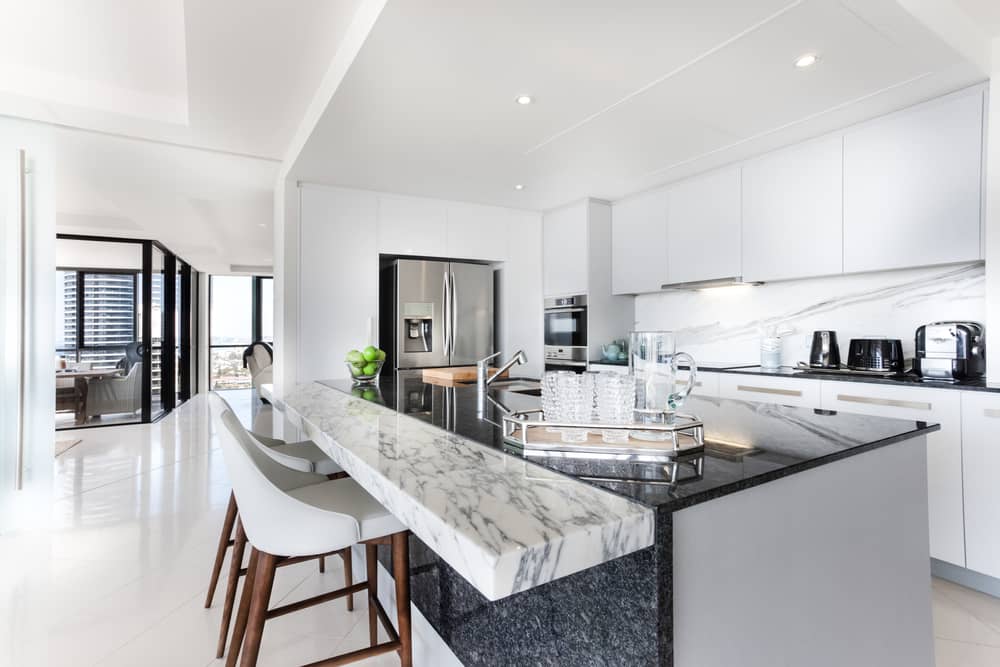A marble benchtop adds a classy look to any home kitchen – or really, any room in the house.
But while the aesthetic is definitely worth it, marble can be a bit high-maintenance since it’s a delicate material. Regular cleaning is essential to maintaining the natural stone.
How to clean marble benchtops? There are several ways:
It’s also important to polish and seal a marble benchtop to protect the material. After all, the marble is the statement piece of your kitchen – you want it to look its absolute best.
What to Know About Marble Surfaces
Marble is a natural stone material, much like quartz (“engineered stone”) or soapstone. It’s a popular choice of material for kitchen benchtops and backsplashes.
Many households also use it on other surfaces – say, some classy marble floors or bathroom vanities.
However, marble is more porous than other natural stones. This makes it susceptible to stains and etching (light scratches and other physical changes to stone).
Because of this, you’ll need to clean a marble benchtop often and have it sealed regularly.
How Often to Clean Marble Benchtops
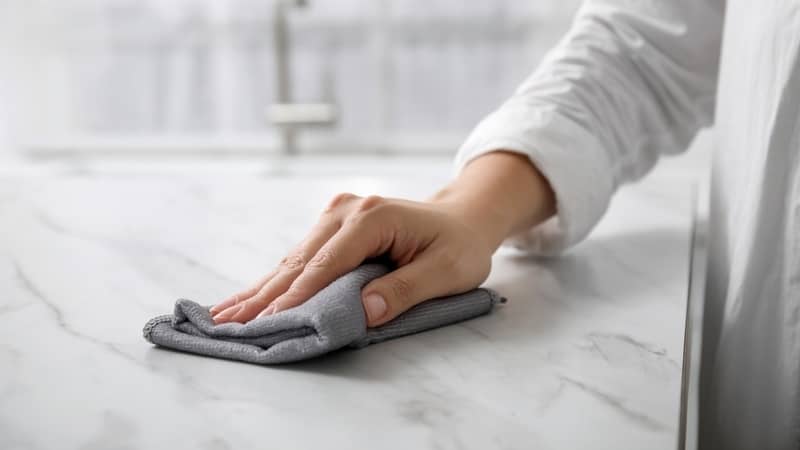
Clean up spills immediately. The longer you let a substance sit on a marble surface, the harder it will be to remove.
Wipe high-use areas daily with soapy water.
Then dust once a week with a microfibre cloth.
How to Clean Marble Benchtops
Cleaning stone benchtops is always a bit tricky, but marble is more delicate than most other types of natural stone. Always test your cleaning solution on an inconspicuous area first!
If you’re hiring a professional home cleaner, check with them about the best cleaning method for your marble benchtops.
Before you clean a marble benchtop
If you’ve spilled something, blot it right away. Don’t wipe – you’ll just push the substance over the surface.
Take a soft cloth or some paper towels and blot the spill. Remove any solids as well.
Cleaning marble benchtops with dishwashing liquid
For everyday cleaning, a solution of dishwashing liquid and warm water works perfectly. Choose a pH-neutral soap – ideally with anti-grease properties.
Simply mix a few drops of dishwashing liquid into warm water. Dampen a soft cloth with the mixture and wipe down the marble surface.
Dry the benchtop immediately to prevent water spots.
NOTE: The head of a dust mop could also work in a pinch if you don’t have any cloths!
Cleaning marble benchtops with baking soda
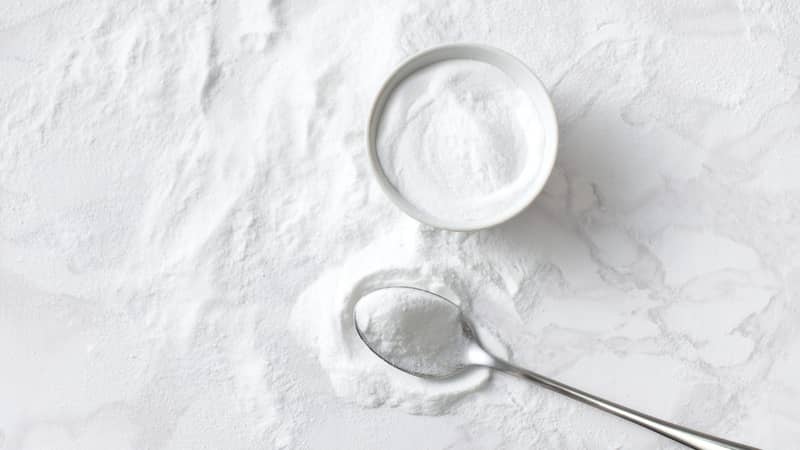
This method is great for cleaning stains on marble from coffee, wine, other drinks, and even sauces.
You can opt to sprinkle baking soda onto the affected area and let it sit for 20–30 minutes. It will absorb the liquid, then you can just wipe off the residue afterwards.
Alternatively, you can try the poultice method. Mix 1 tablespoon of baking soda with a little hydrogen peroxide to form a thick paste.
Dampen the stained area with a little water, then spread a thick layer of the paste on the surface. Seal it with some cling wrap or a similar material.
Let the solution sit for a day or two, until it thoroughly dries. Once you notice the poultice has dried up, take off the plastic and wipe the residue off with a damp cloth.
Dry the surface immediately. For more stubborn stains, you can repeat the process.
NOTE: You can also use this method to remove paint from marble. If you can’t scrape off all the paint, apply the poultice to remove the remaining residue.
Cleaning marble benchtops with cornflour
This is a great solution for grease stains! Soap and water won’t be very effective here, so you can turn to cornstarch instead.
Simply sprinkle the cornflour on the grease or oil stains, then let it sit for 20 minutes. The cornflour will absorb the grease.
Use a damp cloth to wipe the residue away, then a fresh cloth to dry the surface.
Cleaning marble benchtops with hydrogen peroxide
For light-coloured marble, you can use hydrogen peroxide when removing stains. It works best for organic stains, such as those from food.
Apply 12% hydrogen peroxide (optional: add a few drops of ammonia) directly to the stain and let it sit for a few minutes.
Rinse away with clean water, then dry the benchtop immediately.
Cleaning marble benchtops with stone cleaner
There are some commercial cleaning sprays and other products that are formulated specifically for natural stone.
When cleaning your marble, follow the package instructions precisely. Make sure you dry the surface afterwards.
How to Polish a Marble Benchtop
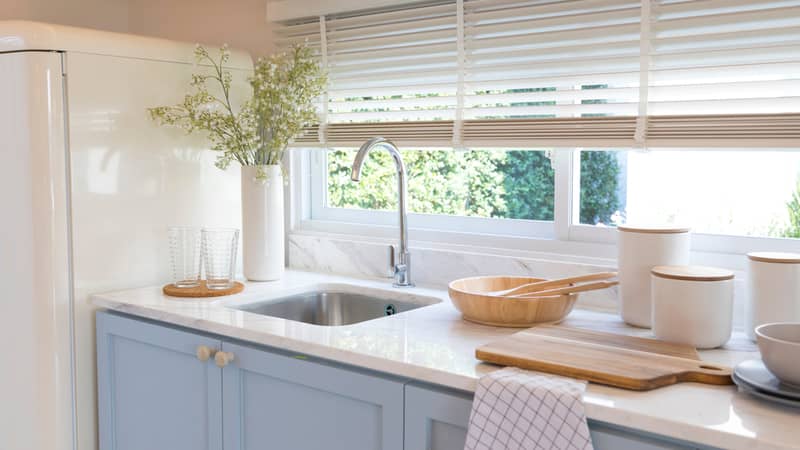
Part of proper maintenance for marble is polishing! Make sure you’re using products specifically made for marble – so no acrylic or polyurethane.
DIY marble polishes come in either chalk or liquid form. Both provide a stain-resistant finish, but chalk takes longer to dry.
Start from the centre of your benchtop and work your way outwards. Follow with a diamond polishing pad or soft cloth to buff the marble in circular motions.
When buffing, work in the opposite way – from the outside going in.
Leave the benchtop for several hours so the polish dries completely. Then go over the surface one more time with a dry cloth to remove any residue.
Protecting and Maintaining a Marble Benchtop
Maintenance and protection are just as important as regular cleaning!
This will prevent damage to your marble benchtop, which will be harder to fix than a simple stain.
1. Blot spills, don’t wipe
When cleaning up spilled food or drinks, always dab and blot the stain. Wiping or rubbing will push the stain further into the marble.
If there are cracks or seams in your benchtop, food debris or liquids could lead to bacteria and mould growth.
For larger spills, you can layer cloths or paper towels to absorb the substance.
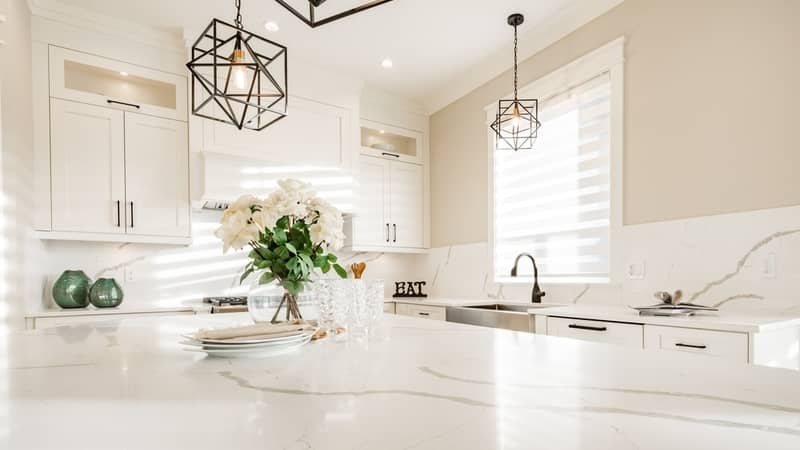
2. Regularly seal marble surfaces
Marble is very porous, so it’s essential to protect your benchtop with professional sealant.
Sealing marble will not make it waterproof, but it will create a protective barrier that will minimise staining and etching.
3. Don’t use abrasive cleaners
Avoid abrasive scrubbers like steel wool since these could leave scratches and scuff marks on the marble. Remember, this type of natural stone is delicate!
Don’t use abrasive cleaning products as well – anything rougher than baking soda could also scuff the surface.
If there are water spots or light scratches, you can buff them with dry #0000 (superfine) steel wool. Anything worse will need professional work.
4. Don’t use too acidic or alkaline cleaning materials
Acid is generally not recommended for cleaning natural stone, as it can cause discolouration or even damage the material. It’s the same with alkaline substances like bleach.
You can consult the company that installed your benchtop whether you can safely use white vinegar or lemon juice on the marble.
In general, it’s better to stick to more neutral cleaners.
Hydrogen peroxide is typically safe for light-coloured marble as it is a very weak acid, with a pH of just 6.2.
5. Wipe marble countertops regularly
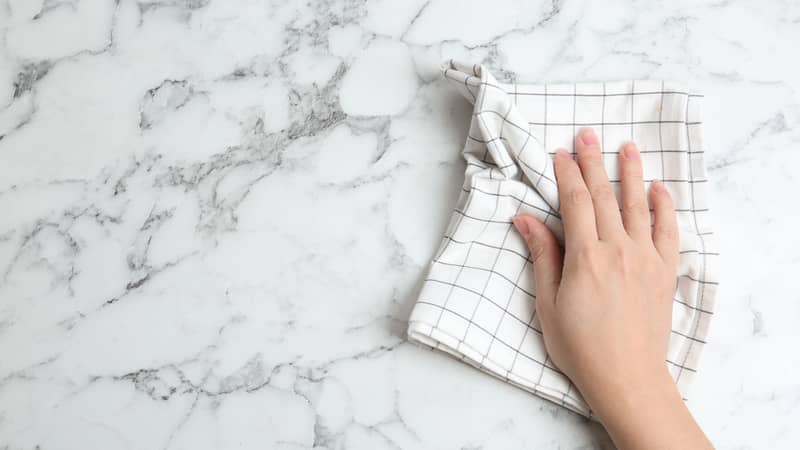
Frequent wiping goes a long way to preventing dirt and stains from building up on marble!
You can use a dry cloth to wipe the surface after you’ve finished prepping or cooking.
6. Avoid putting hot items on stone surfaces
While cooking, avoid putting hot dishes or pans directly on the marble. It may be naturally heat-resistant, but you’ll still risk cracking or scorching the surface.
Instead, lay down coasters, trivets, or other similar heat protectors before setting down your dishes and pans.

